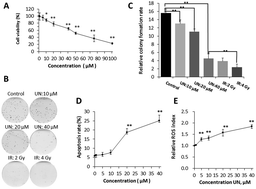当前位置:
X-MOL 学术
›
Toxicol. Res.
›
论文详情
Our official English website, www.x-mol.net, welcomes your
feedback! (Note: you will need to create a separate account there.)
Inhibitory effect of uranyl nitrate on DNA double-strand break repair by depression of a set of proteins in the homologous recombination pathway
Toxicology Research ( IF 2.2 ) Pub Date : 2017-07-10 00:00:00 , DOI: 10.1039/c7tx00125h Feng Jin 1, 2, 3, 4 , Teng Ma 4, 5, 6, 7, 8 , Hua Guan 4, 5, 6, 7, 8 , Zhi-Hua Yang 4, 5, 6, 7, 8 , Xiao-Dan Liu 4, 5, 6, 7, 8 , Yu Wang 4, 5, 6, 7, 8 , Yi-Guo Jiang 4, 9, 10, 11, 12 , Ping-Kun Zhou 4, 5, 6, 7, 8
Toxicology Research ( IF 2.2 ) Pub Date : 2017-07-10 00:00:00 , DOI: 10.1039/c7tx00125h Feng Jin 1, 2, 3, 4 , Teng Ma 4, 5, 6, 7, 8 , Hua Guan 4, 5, 6, 7, 8 , Zhi-Hua Yang 4, 5, 6, 7, 8 , Xiao-Dan Liu 4, 5, 6, 7, 8 , Yu Wang 4, 5, 6, 7, 8 , Yi-Guo Jiang 4, 9, 10, 11, 12 , Ping-Kun Zhou 4, 5, 6, 7, 8
Affiliation

|
Occupational and environmental exposure to uranium has been confirmed to cause tissue injury and carcinogenesis. As a heavy metal from actinide series, the chemical and radiological toxicities of uranium jointly induce the detrimental effects. However, the mutual action and mechanism of both forms of toxicities still need to be further elucidated. DNA double-strand break (DSB) is a fundamental cause of cell death or genomic instability induced by ionizing radiation. Herein, we investigate the effect of uranyl nitrate on the cellular function of DNA damage response and intrinsic DSB repair on the aspect of chemical toxicity. The results indicated that uranyl ion increased the accumulation of nuclear DNA DSBs in a dose-dependent manner. Both homologous recombination (HR) and non-homologous end joining (NHEJ) pathways of DSB repair were affected by the uranyl ion. The inhibition of DSB repair efficiency is attributed to the depression of a set of critical repair proteins, particularly those for the HR pathway such as ATM, BRCA1, RPA80 and EXO1. The available data enable us to imagine that the chemical toxicity of uranium leads to inhibition of cellular DNA repair capability, which can further aggravate its radiological toxicity.
中文翻译:

硝酸铀酰对同源重组途径中一组蛋白质的抑制作用对DNA双链断裂修复的抑制作用
已确认职业和环境暴露于铀会导致组织损伤和致癌作用。作为act系元素的重金属,铀的化学和放射毒性共同引起有害作用。但是,两种毒性形式的相互作用和机理仍需进一步阐明。DNA双链断裂(DSB)是电离辐射引起的细胞死亡或基因组不稳定的根本原因。在本文中,我们从化学毒性方面研究了硝酸铀酰对DNA损伤反应和内在DSB修复的细胞功能的影响。结果表明,铀酰离子以剂量依赖的方式增加了核DNA DSB的积累。铀酰离子影响DSB修复的同源重组(HR)和非同源末端连接(NHEJ)途径。对DSB修复效率的抑制归因于一组关键修复蛋白的降低,尤其是用于HR途径的关键修复蛋白,例如ATM,BRCA1,RPA80和EXO1。现有数据使我们能够想象铀的化学毒性会导致细胞DNA修复能力的抑制,从而进一步加剧其放射毒性。
更新日期:2017-08-29
中文翻译:

硝酸铀酰对同源重组途径中一组蛋白质的抑制作用对DNA双链断裂修复的抑制作用
已确认职业和环境暴露于铀会导致组织损伤和致癌作用。作为act系元素的重金属,铀的化学和放射毒性共同引起有害作用。但是,两种毒性形式的相互作用和机理仍需进一步阐明。DNA双链断裂(DSB)是电离辐射引起的细胞死亡或基因组不稳定的根本原因。在本文中,我们从化学毒性方面研究了硝酸铀酰对DNA损伤反应和内在DSB修复的细胞功能的影响。结果表明,铀酰离子以剂量依赖的方式增加了核DNA DSB的积累。铀酰离子影响DSB修复的同源重组(HR)和非同源末端连接(NHEJ)途径。对DSB修复效率的抑制归因于一组关键修复蛋白的降低,尤其是用于HR途径的关键修复蛋白,例如ATM,BRCA1,RPA80和EXO1。现有数据使我们能够想象铀的化学毒性会导致细胞DNA修复能力的抑制,从而进一步加剧其放射毒性。











































 京公网安备 11010802027423号
京公网安备 11010802027423号